The road from Point A to Point C doesn’t necessarily pass through Point B.
Consider Doug McClain. Native Oklahoman. Career Navy officer and aviator, former Blue Angel; retired as a rear …
This item is available in full to subscribers.
To continue reading, you will need to either log in to your subscriber account, below, or purchase a new subscription.
Please log in to continue |
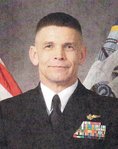
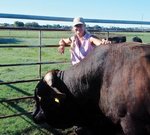



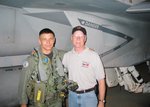

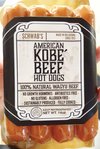
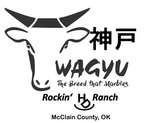

The road from Point A to Point C doesn’t necessarily pass through Point B.
Consider Doug McClain. Native Oklahoman. Career Navy officer and aviator, former Blue Angel; retired as a rear admiral after 31 years service.
Since 2012, he has devoted his time and energy to raising Wagyu and Beefmaster cattle on the Rockin’ HD Ranch near Wayne. McClain owns the ranch with his wife, Doni.
Not familiar with Wagyu cattle? The breed originated in Japan where it is known as Kobe.
Under McClain’s guidance, the ranch is developing what he describes as “full life cycle” MIO (Made in Oklahoma) Wagyu beef products.
“Our success is due to good business practice, good neighbors and good dirt,” McClain said. “The ranch is the greatest location in the world being right on the river.”
So his revelation in one of those if-I-had-it-to-do-over moments may surprise you.
“If I had anything to do over again, I would be a professional bass fisherman,” he said.
Which is a far cry from flying fighter jets off an aircraft carrier or operating a ranch.
Yet in a roundabout way, it was his love of fishing that first planted the cattle ranching seed. And that seed flourished in some pretty surprising places, thanks to the Navy.
At nearly every assignment, McClain found himself befriending area cattlemen.
In the early 1970s, McClain did most of his angling in Oklahoma stock ponds.
The father of a good friend raised Beefmaster cattle in the Fort Cobb/Carnegie area.
“Every Saturday before I could fish, I had to work the cattle,” he said. “Over time I became a better cowboy than anything else. I fell in love with those big bulls.”
After high school, McClain attended the University of Colorado. He later transferred to the University of Oklahoma, graduating in 1979 with a degree in business administration.
He also began a Navy career with a commission as an ensign through the Navy’s ROTC program.
He was sent to flight school at the Naval Aviation Station at Kingsville, Texas.
One of his neighbors was a ranch manager for the famed King Ranch.
He later served in Central California at one of the largest Naval Air Stations in the world.
Lemoore NAS is near Fresno in an area filled with cotton and dairy farms.
Doni played basketball at the University of Colorado and in 1980 had an opportunity to play basketball for the United States in the Olympics.
But the U.S. boycotted the Games to protest the Soviet’s invasion of Afghanistan.
“She never picked up a basketball again,” McClain said.
Instead, she became a soccer coach. At Lemoore, she solicited the support of the dairy farmers who turned out with their heavy equipment to build a 12-field soccer complex under her guidance.
“The dairy farmers were our family friends,” McClain said. “I was around their cattle a lot.”
It was especially fortuitous when the Navy sent McClain to Atsugi, Japan.
He met the owner of Japan Air Lines, who invited the McClains to dinner at his home in Saporro.
“It was a very big deal, very traditional but with a lot of western influence,” McClain said,
His Japanese host was also a cattleman and owned the largest Wagyu herd in the country.
“The table was about 60 feet around with the chefs in the center. They did what they call ‘parade the beef,’” McClain said. “My wife and his wife hit it off. We became the best of friends.”
McClain explained that the Japanese closely guard Wagyu genetics and are loathe to export the cattle.
But in the early 1970s, the first Wagyu cattle arrived in this country to be studied by beef specialists. It was strictly a loan and the cattle were to be returned to Japan.
That isn’t what happened.
When Japan placed limits on imports of beef from the U.S., the government reacted by refusing to return the Wagyu to Japan.
By the time McClain retired from the Navy in 2011, his plan to become a rancher was beginning to gel.
“I never wanted to work for the government or another company,” he said. “I was just done with that. I was in the Pentagon on 9-11. That pretty much shaped who I am.”
In 2012, he returned to Oklahoma and purchased land along the Canadian River northeast of Wayne.
“I came back to be a Beefmaster breeder and bought a Beefmaster herd,” he said, adding he also purchased some Wagyu cows.
Like the Beefmasters, Wagyu are a very docile breed.
In the years since, the ranch has grown and gone high-tech.
“We now have about 100 fullblood bulls,” McClain said. “We lease sires to producers and buy the calves back. We also collect embryos and semen. We keep the embryos and implant them in our recipient cows. We had to build the herd ourselves
“The ranch has a unique product that is 100 percent made in Oklahoma.”
The cattle are processed by the Quapaw Tribe at Miami. It is the only USDA-approved plant in Oklahoma for individual producers like McClain.
Eventually, McClain hopes to interest the Chickasaw Nation in partnering with him to build a processing plant on State Highway 59 east of I-35. With the proximity to Mid-America Technology Center, McClain envisions MATC expanding their animal husbandry program.
McClain’s estimate to build such a plant is $5 to $7 million.
“I talk to hundreds of beef producers and they all say ‘When are you going to build that beef processing plant?’” he said.
One partner he already has is Dr. Zach Moffatt, a Norman dentist and owner of Tractor Hat Farm off Ladd Road.
Their company, Fresh from Oklahoma LLC, is generating profits by utilizing the trimmings left from the beef carcasses when the more desirable cuts of meat are sold to high-end restaurants.
“We sell all the middle meats to restaurants,” McClain said. “And we end up with a lot of trimmings.”
One of his partners approached Schwab Meats, which developed Kobe beef hotdogs using Wagyu beef from the Rockin’ HD Ranch.
“They took off,” he said of the Kobe hot dogs.
Then about 1-1/2 years ago, McClain and his partners found a processor in Odessa, Texas, that was turning out a smoked product best described as “jerky on steroids.”
“We wanted to do something like that with Wagyu,” he said.
The result is a brand new product being marketed at Uptown Grocery in Oklahoma City, as well as a chain of convenience stores in south Texas.
The Wagyu jerky and beef sticks are also ideal fundraisers for bands and school organizations.
A school for the developmentally disabled at Stratford operates a “store” for students. It sells 100 beef sticks a week, making $1 on each.
In addition, McClain turns some of his profits from the sales to support Fields of Honor, a charity helping combat veterans cope with PTSD.
Doni also sells Rockin’ HD products at farmers markets in Norman and Oklahoma City. She is a prime vendor at the OKU-OKC market on Saturdays.
Meanwhile, McClain pursues other marketing venues.
“I want Loves to pick them up,” he said of the products.
McClain has also taken on a wildlife conservation mission at the ranch.
He buys 500 quail a year from a hatchery and now has several established coveys of the birds on the ranch, as well as surrounding properties.
“I want to return quail to Oklahoma,” he said.
Quail, once plentiful in Oklahoma, have all but disappeared across the state – a decline he blames on an out-of-control wild turkey population. The wild turkeys eat the quails’ eggs, he said.
In such free time as he has, McClain is devoted to another passion – speaking to young people.
He had addressed several career days and has been a Boys State speaker “four or five times.”
Though his Navy aviator days are in the rearview mirror, McClain is still a pilot. And one day he wants to buy an airplane.
But not quite yet.
He has become the Oklahoma cowman of his dreams.
Life doesn’t get any better than that and is meant to be enjoyed.
Comments
No comments on this item Please log in to comment by clicking here